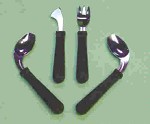If your loved one is in the later stages of Alzheimer’s disease, she may have problems centered on eating and drinking. This can have an effect on the types and quantities of food she drinks, which can lead to poorer overall health. As a caregiver for your loved one, please be assured that there are easy ways to make sure that she is getting the nutrition that she needs to keep up her strength and overall health.
What Causes Poor Appetite?
A person who is suffering from dementia could develop a poor appetite, or just lose interest in food overall. This can lead to a loss in weight and to poor health.
Poor appetite can be caused by several things. She may have changed her food preferences as the disease progresses, or she might have problems chewing and swallowing food. Some patients also have coordination issues that can affect eating and drinking. The patient also may simply be depressed as she gets further along with her illness.
How to Stimulate Appetite?
There are many easy ways to stimulate the appetite and interest in food for your loved one. Be sure that find out what types of food she likes currently, and what types of food she is able to manage to eat without difficulty. And keep these tips in mind too:
- Make the food look attractive to eat. Using food with color, such as chopped fruit, can help to catch her eye.
- Do not pile too much food on her plate. This can be intimidating. Instead, offer smaller amounts several times per day.
- Be more flexible and allow her to choose eating times that work for her. Some patients will eat better at different parts of the day. Some Alzheimer’s patients are crankier at the end of the day (sundowning behavior, as it is called), so you might want to shift larger meals to earlier in the day.
- She may lose interest in food that has gotten cold. It is more likely that food will get cold if she is having problems with swallowing or with coordination. So, serve smaller portions and keep the rest warm until that first part is finished.
- Use your microwave to reheat the food during the meal.
Helpful Dining Aids to Ease the Eating Process
There are many helpful and inexpensive dining supplies for Alzheimer’s patients that can make eating much easier for them. GripWare High Sided Dishes have sides that are tall and non slip rubber feet on bottom. People who have less hand coordination or weakness in the hands could find it easier to scoop up food with this helpful product.
Melaware Cutlery features eating utensils with tapered handles and curves that makes it easier for the patient to eat meals. Spoons are angled for proper use with the right or left hand and are perfect for people with less motion in the wrists.


